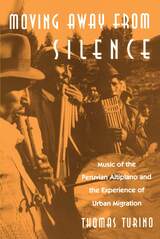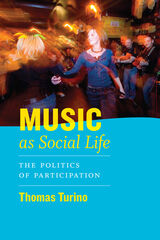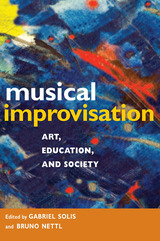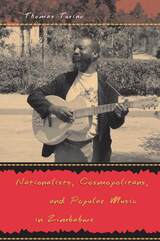4 books about Turino, Thomas

Moving Away from Silence
Music of the Peruvian Altiplano and the Experience of Urban Migration
Thomas Turino
University of Chicago Press, 1993
Increasingly popular in the United States and Europe, Andean panpipe and flute music draws its vitality from the traditions of rural highland villages and of rural migrants who have settled in Andean cities. In Moving Away from Silence, Thomas Turino describes panpipe and flute traditions in the context of this rural-urban migration and the turbulent politics that have influenced Peruvian society and local identities throughout this century.
Turino's ethnography is the first large-scale study to concentrate on the pervasive effects of migration on Andean people and their music. Turino uses the musical traditions of Conima, Peru as a unifying thread, tracing them through the varying lives of Conimeos in different locales. He reveals how music both sustains and creates meaning for a people struggling amid the dramatic social upheavals of contemporary Peru.
Moving Away from Silence contains detailed interpretations based on comparative field research of Conimeo musical performance, rehearsals, composition, and festivals in the highlands and Lima. The volume will be of great importance to students of Latin American music and culture as well as ethnomusicological and ethnographic theory and method.
Turino's ethnography is the first large-scale study to concentrate on the pervasive effects of migration on Andean people and their music. Turino uses the musical traditions of Conima, Peru as a unifying thread, tracing them through the varying lives of Conimeos in different locales. He reveals how music both sustains and creates meaning for a people struggling amid the dramatic social upheavals of contemporary Peru.
Moving Away from Silence contains detailed interpretations based on comparative field research of Conimeo musical performance, rehearsals, composition, and festivals in the highlands and Lima. The volume will be of great importance to students of Latin American music and culture as well as ethnomusicological and ethnographic theory and method.
[more]

Music as Social Life
The Politics of Participation
Thomas Turino
University of Chicago Press, 2008
People around the world and throughout history have used music to express their inner emotions, reach out to the divine, woo lovers, celebrate weddings, inspire political movements, and lull babies to sleep. In Music as Social Life, Thomas Turino explores why it is that music and dance are so often at the center of our most profound personal and social experiences.
Turino begins by developing tools to think about the special properties of music and dance that make them fundamental resources for connecting with our own lives, our communities, and the environment. These concepts are then put into practice as he analyzes various musical examples among indigenous Peruvians, rural and urban Zimbabweans, and American old-time musicians and dancers. To examine the divergent ways that music can fuel social and political movements, Turino looks at its use by the Nazi Party and by the American civil rights movement. Wide-ranging, accessible to anyone with an interest in music’s role in society, and accompanied by a compact disc, Music as Social Life is an illuminating initiation into the power of music.
Turino begins by developing tools to think about the special properties of music and dance that make them fundamental resources for connecting with our own lives, our communities, and the environment. These concepts are then put into practice as he analyzes various musical examples among indigenous Peruvians, rural and urban Zimbabweans, and American old-time musicians and dancers. To examine the divergent ways that music can fuel social and political movements, Turino looks at its use by the Nazi Party and by the American civil rights movement. Wide-ranging, accessible to anyone with an interest in music’s role in society, and accompanied by a compact disc, Music as Social Life is an illuminating initiation into the power of music.
[more]

Musical Improvisation
Art, Education, and Society
Edited by Gabriel Solis and Bruno Nettl
University of Illinois Press, 2008
"Cutting across traditional subject boundaries in music and cultural studies, this admirably comprehensive work adopts a welcome interdisciplinary ideal and makes a truly significant contribution to our knowledge of musical improvisation."--Robert Witmer, professor emeritus of music, York University
Contributors are Stephen Blum, Patricia Shehan Campbell, Sabine M. Feisst, Lawrence Gushee, Robert S. Hatten, William Kinderman, Natalie Kononenko, Robert Levin, Charlotte Mattax Moersch, Ingrid Monson, John P. Murphy, Bruno Nettl, A. Jihad Racy, Anne K. Rasmussen, Stephen Slawek, Gabriel Solis, Nicholas Temperley, John Toenjes, and Thomas Turino.
[more]

Nationalists, Cosmopolitans, and Popular Music in Zimbabwe
Thomas Turino
University of Chicago Press, 2000
Hailed as a national hero and musical revolutionary, Thomas Mapfumo, along with other Zimbabwean artists, burst onto the music scene in the 1980s with a unique style that combined electric guitar with indigenous Shona music and instruments. The development of this music from its roots in the early Rhodesian era to the present and the ways this and other styles articulated with Zimbabwean nationalism is the focus of Thomas Turino's new study. Turino examines the emergence of cosmopolitan culture among the black middle class and how this gave rise to a variety of urban-popular styles modeled on influences ranging from the Mills Brothers to Elvis. He also shows how cosmopolitanism gave rise to the nationalist movement itself, explaining the combination of "foreign" and indigenous elements that so often define nationalist art and cultural projects. The first book-length look at the role of music in African nationalism, Turino's work delves deeper than most books about popular music and challenges the reader to think about the lives and struggles of the people behind the surface appeal of world music.
[more]
READERS
Browse our collection.
PUBLISHERS
See BiblioVault's publisher services.
STUDENT SERVICES
Files for college accessibility offices.
UChicago Accessibility Resources
home | accessibility | search | about | contact us
BiblioVault ® 2001 - 2024
The University of Chicago Press









